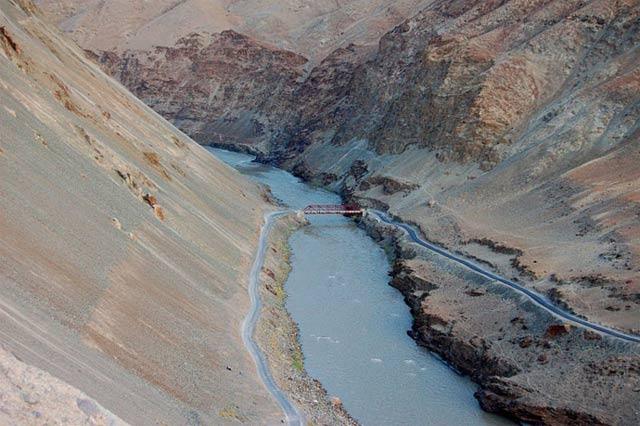Islamabad:
Pakistan will take all appropriate measures to safeguard their due participation in the water, guaranteed by the Indo Water Treaty (IWT), Foreign Minister Ishaq Dar declared, who presided over a high -level meeting on Monday to discuss the country’s strategy following the Indian movement in the critical water agreement.
The meeting was attended by the ministers of laws and justice and water resources, attorney general, senior officials and technical experts, according to an official brochure issued by the Ministry of Foreign Affairs.
The meeting was convened to prepare Pakistan’s strategy after India suspended the IWT of 1960, after an attack against tourists in the Pahalgam area of India illegally occupied Jammu and Kashmir (Iiojk) on April 22.
The Indian decision was part of its series of measures to penalize Pakistan for its supposed role in the murder of tourists in the region in dispute. Islamabad vehemently denied the position of New Delhi and offered to be part of any “neutral, transparent and credible” investigation.
While the possible military consequences of the current crisis are afraid, the most important problem at this time is the destination of the IWT that governs the 6 rivers water exchange that passes through India.
The treaty negotiated by the World Bank resisted the wars, several phases of tensions and other crises between the two countries.
But for the first time, the Indian government decided to use water as a weapon, a movement that triggered a strong response from Islamabad, which warned that any attempt to divert, stop or reduce water belonging to Pakistan would be treated as an act of war.
The Foreign Minister, according to the statement, emphasized that Pakistan will take all appropriate measures to safeguard his due participation in the water, guaranteed by the treaty.
He stressed that the unilateral and illegal movement of India to maintain the treaty in suspense contravened the established norms of interstate relationships, international law and the IWT provisions.
He stressed that the treaty is critical for regional stability and its holiness must be preserved. By pointing out that the waters of the Indo River system remain a lifeguard for the 240 million people of Pakistan, deplored the Indian attempts to arm the water.
He reiterated that Pakistan will continue to advocate for the complete implementation of the treaty to guarantee the protection of their water rights and the well -being of its people.
The IWT was signed in 1960 between India and Pakistan, with the World Bank as Corridor and guarantor. Assign the Eastern rivers (Dravi, Beas, Sutlej) to India and Western Rivers, Indus, Jhelum, Chenab-to Pakistan.
India receives around 33 million acres-fo or 20% of the total of 168 million water acres-pies, of which it uses 93-94%. The remaining unused water flows to Pakistan.
According to officials, the treaty does not have a unilateral output clause. IWT article 12 clearly establishes that “the provisions of this treaty … will continue in force until a properly ratified treaty ends concluding … between the two governments.”
According to international law, particularly the “Vienna Convention on the Law of Treaties (1969)”, a State cannot withdraw from a treaty unless any of the parties or the treaty itself allows it.
The IWT is specific to the State, not specific to the regime and legally binding. India cannot revoke the treaty unilaterally under article 12 (4) of IWT.
The IWT provides a structured dispute resolution mechanism that includes bilateral talks, a neutral expert (Annex F) and an arbitration court (Annex G). Pakistan can invoke article 9 to intensify the matter.
Experts are from the opinion that India cannot physically suspend the IWT without long -term massive infrastructure projects. The flow of Río Natural, the geographical limitations and the risks of military escalation make the unilateral action strategically unfeasible, according to experts.
They also point out that unilaterally suspending the treaty would violate international law and establish a dangerous precedent for superior riverside as China. China could follow India’s precedent by suspending the flow of water to India in the Brahmaputra river.
Experts believe that the IWT suspension would represent a severe threat to Pakistan water security, impacting agriculture, drinking water and food supply, which probably leads Islamabad to seek legal and diplomatic resources through the UN mechanisms, the ICJ and the World Bank.
Pakistan can also approach the UN Security Council under article 35 of the UN Charter, which allows any UN Member State to bring a dispute or situation that can endanger international peace and security to the attention of the Council.
Pakistan can form alliances with another lower riverside state (Nepal, Bangladesh, Bután) for collective water diplomacy. The IWT has served as a stabilizing force in southern Asia, its interruption could increase geopolitical tensions, the risk of environmental degradation and destabilize millions that depend on the Indo basin, according to officials.
Pakistan already warned that unilateral suspension could destabilize key bilateral agreements such as Simla’s agreement (1972), Karachi’s agreement (1949) and vital CBMs, indicating India’s will to avoid structured and potentially unraveling diplomatic diplomatic framework.




